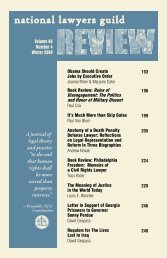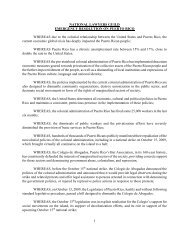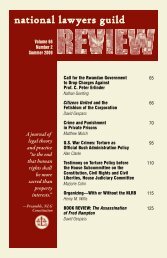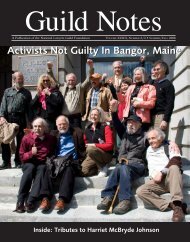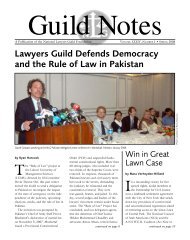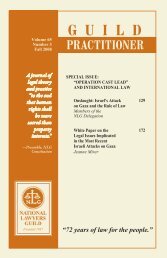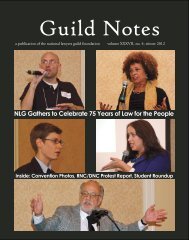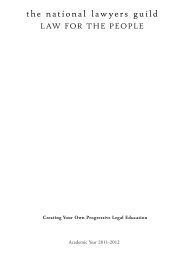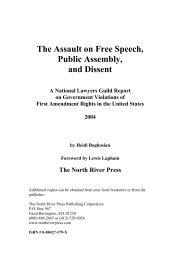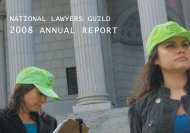NLGRev 68-2[1].indd - National Lawyers Guild
NLGRev 68-2[1].indd - National Lawyers Guild
NLGRev 68-2[1].indd - National Lawyers Guild
You also want an ePaper? Increase the reach of your titles
YUMPU automatically turns print PDFs into web optimized ePapers that Google loves.
88 national lawyers guild review<br />
report made it perfectly clear that women are forced into prostitution due to<br />
economic need and sheer survival. 191 Under such extreme conditions, it is unlikely<br />
that any of these women offer genuine consent to be used as prostitutes.<br />
Committee reports repeatedly observed a connection between poverty and<br />
prostitution. The CEDAW committee questioned, in the Finland Concluding<br />
Observations, “[w]hether an increase in prostitution and traffic in women<br />
was noticeable in view of the dire economic situation of the Baltic States<br />
and whether related interim measures had been taken.” 192 The Committee<br />
made a similar observation in its report on Fiji, stating its concern with the<br />
increasing prostitution problem because of economic hardship. 193 Likewise in<br />
the Czech Republic Conclusions, the Committee recognized that discrimination<br />
against women (e.g. wage disparities), segregation into low paying jobs,<br />
rising unemployment, and the lack of opportunities for women has been a<br />
driving force for prostitution and trafficking. 194 To combat these considerable<br />
problems, the Committee recommended that the government work to fight<br />
the feminization of poverty and to improve the economic situation of women<br />
in order to prevent trafficking and prostitution.<br />
Finally, the link between prostitution and the lack of job opportunities was<br />
highlighted in the Committee’s report on Cuba. 195 The Committee credited<br />
both a growing tourist base and economic problems for women as the impetus<br />
behind the rebirth of prostitution in Cuba. 196 Again, the Committee appealed<br />
to the Cuban government “[t]o offer more and better job opportunities to<br />
women who engaged in prostitution, and not to place the sole responsibility<br />
for prostitution on the women themselves.” 197<br />
So long as women are denied very basic means of survival—decent economic<br />
opportunities and equality in the marketplace—they can never hope<br />
to achieve social equality. Maintaining prostitution as a viable last refuge<br />
for poverty-stricken women is inherently untenable. So long as prostitution<br />
remains as an “option” for poor women, there will be less incentive to develop<br />
educational opportunities, job programs, or economic policies that could lift<br />
these women out of poverty in a positive, therapeutic fashion.<br />
Legalization of prostitution violates CEDAW Articles 2(f) and 5(a) to<br />
eliminate practices based on the idea of the inferiority of women<br />
Article 2(f) of CEDAW mandates that parties to the Convention shall<br />
“take all appropriate measures, including legislation, to modify or abolish<br />
existing laws, regulations, customs and practices which constitute discrimination<br />
against women.” 198 Article 5(a) requires “all appropriate measures”<br />
be taken to “modify the social and cultural patterns of conduct of men and<br />
women,” so as to eliminate prejudices, customs, and any other behaviors or


![NLGRev 68-2[1].indd - National Lawyers Guild](https://img.yumpu.com/30820772/26/500x640/nlgrev-68-21indd-national-lawyers-guild.jpg)
